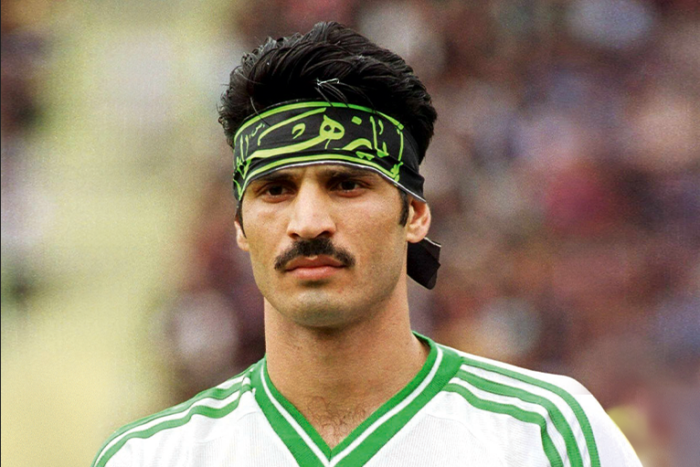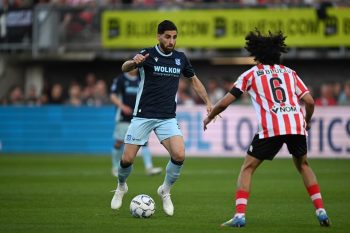Ali Daei: ‘Football is the Love of My Life’

GQ – DUBAI, For 15 and a half years, Iranian legend Ali Daei had scored more international goals than anybody… ever. Last month, Cristiano Ronaldo took that title from him, but that’s ok. He’s focussing on the bigger picture
As it turned out, Ali Daei did not witness the passing of his torch. When Cristiano Ronaldo was wheeling away in celebration thousands of miles away in the Algarve, Daei was traveling from Tehran to the Caspian Sea for a well-timed vacation. But it didn’t take him long to find out – the barrage of social media messages as inevitable as they were immediate. For 15 years, the Iranian football icon had held the men’s international scoring record – his 109 goals setting a formidable football benchmark. But now that was over.
“People may think I’d be sick of being asked about Ronaldo but honestly I’m not,” says Daei, looking cool and collected in a navy shirt. “He is a great sporting personality and a gentleman off the pitch in my experience. He’s a champion of the sport and it is an honor that it is now his record to carry.”
For Ali Daei, who retired from playing in 2006, the record has been neither an albatross around his neck nor a cause for major celebration. It has certainly led to him receiving global acclaim and a higher profile, but life, he asserts, is more nuanced than a list of FIFA goalscorers. “Football and records are one part of my life but there is so much more to me. There are more valuable things that I have learned in my life and career. What I do now in society – to try and impact people and to speak for them – this means more to me than a goalscoring record. These are the things that won’t be forgotten.”
Daei’s path to the top of football’s scoring charts was markedly different to that of his usurper. Ronaldo was a prodigious teenager and Ballon d’Or winner at 23. Daei was a metallurgic engineering student who only made his international debut at 24. “My father never wanted me to be a professional footballer,” Ali Daei recalls. “For him, education came first. So, my mum had to sneak my kit to me for matches.”
But destiny finds a way, and it was his focus on education that ultimately led to Daei’s sporting talent being discovered. He grew up admiring German icon Franz Beckenbauer – later emulating him by joining European heavyweights Bayern Munich – but as a teenager swapped the northern Iranian city of Ardabil for capital Tehran to pursue a BSc at the Sharif University of Technology. He initially played casual games to unwind outside of his studies but was soon snapped up, first by local club Esteghlal Ardabil and then later, in 1990, Bank Tejarat.
Ali Daei had fallen into professional football but the game welcomed him with open arms. It’s little wonder. By 1994 he had struck an impressive 74 goals in 147 games – just shy of one goal every two matches. He had also made his debut for the Iranian national team one year earlier. On June 6, 2003, Daei pulled on the national shirt for the first of 149 appearances. Tehran’s Azadi Stadium is one of the most intimidating arenas in world football, with 100,000 people regularly squeezing in to create a furnace-like atmosphere. For Daei, it became a second home. “It took a few games to get accustomed to the pressure,” he admits. “After that, all that remained was the magic – the will to play for each and every single one of our compatriots. We had to leave everything we had on the pitch to win for them.” Ali Daei scored an astonishing 109 times in those 149 games, but it’s not the goals that provide his lasting memories of international football, it’s the moments – and one or two in particular.
In 1997, Iran was 2-0 down to Australia, their hopes of qualifying for a first World Cup in 20 years seemingly in tatters. But they dug deep and it was Daei who provided a superb assist for Khoda- dad Azizi’s crucial equalizer – a goal that silenced the 85,000-strong crowd at the Melbourne Cricket Ground and sent Iran to the World Cup at France ’98. “This moment was much more important than all of my goals,” says Ali Daei. “I will never forget. It was miraculous.”
At the World Cup, Daei again played the role of creator in one of the most geopolitically charged matches seen in the history of international football. Iran faced the US in the group stage. The two countries had lost diplomatic ties in 1980 and had precariously negotiated rising tensions ever since. Hyperbolic headlines were stoked when the US Soccer Federation president described it as “the mother of all games”. But while diplomatic fireworks sparked off the pitch, both teams promoted peace on it; Iran’s players handed bouquets of white flowers to their US counterparts ahead of the game and both sides stood side-by-side for a pre-match photo that was steeped in symbolism. Daei set up the winning goal that day, as Iran secured their first-ever World Cup victory, but the striker remembers the occasion for very different reasons. “Yes it was special to win but we, as footballers, showed that sport can be larger than politics. It can bring people together,” he explains. “The camaraderie shown by both sets of players before the game was genuine. I think this was a good day for football and for humanity. These are the moments that will remain with me.”
Eight years later, Ali Daei experienced his final significant World Cup moment, not that he perhaps knew it at the time. The curtain was coming down on the 37-year- old striker’s career and he sat as a frustrated unused substitute as Iran lost 2-0 to Portugal. The scorer of the game’s second goal was a promising 21-year-old by the name of Cristiano Ronaldo. They did not share a pitch but Daei had a front-row seat as Ronaldo, on the cusp of his breakout season with Manchester United, dazzled on the big stage. “It was apparent to me how talented he was, even then,” says Daei. “His level, his quality, his hard work on the pitch – I felt sure that he would be a very special player. Is it sad I couldn’t play? Generally in life, I don’t look back and think how things could have been different.”
Regret is not something Daei has any time for. He has ruffled plenty of feathers in Iran and is rarely afraid to speak his mind. A long-standing feud with ex-national team coach Mayeli Kohan has seen Daei sue his old manager for libel three times, while he is a vocal critic of Iranian football, which he feels is bogged down by twin scourges of bureaucracy and kleptocracy. “It would take days for me to explain the roots of the problem but in short, the biggest issue is the management of the sport in Iran,” Daei claims. “People involved in running football have no experience of football and do not understand it.”
Ali Daei last coached in Iran two years ago with Saipa, the club with whom he started his post-playing career in 2006. In that spell, Saipa won a first, and thus far only, Iranian Pro League title. The return, however, was not such a happy time, with his relationship with the club’s management strained by the end. “You can say football is the love of my life and I have loved coaching as I loved playing. But I don’t have the personality and character to deal with just anyone in football. Football is a big part of my life but it is not my whole life. It is more important to be a free person and to be able to be myself.”
Ali Daei’s willingness to call out those in authority has riled some but also added to his legend in Iran, where he is still widely hero-worshipped. However, the idea of following in Liberian President George Weah’s footsteps and transforming himself from striker to statesman does not appeal. “I will never, ever become involved with politics in Iran,” Daei says firmly. “Not a chance.” Still, he feels a duty to use his prominence to highlight injustice when he sees it. “I have always stayed outside of politics but will always stand with the people of my country. I am not just a sporting personality but a personality of society. If I see things are wrong, if people are suffering, if there are difficulties, I will speak out so their voices are heard. I consider this very important.”
The former striker’s actions have often matched his words. Having amassed a substantial fortune over the years thanks to entrepreneurial exploits that began during his playing career, Daei has demonstrated his philanthropic side by investing in football infrastructure, schools and even building a 20,000-capacity sports complex in his hometown of Ardabil. Much of his wealth came from the eponymous Daei Sport, which manufactures equipment and apparel, supplying kits to many of Iran’s professional clubs and national teams.
Like anybody that has scaled peaks firmly on their own terms, Ali Daei still has plenty of detractors, but the divide between those who abhor and those who adore remains firmly in his favour. “I will never forget the love that Iranian people have shown me – particularly in the many years after my football career finished,” he says. “And the love I have for them is just as strong. For me, it is important that people don’t remember me just as Ali Daei the football player, I want them to remember me as Ali Daei the human being.”




